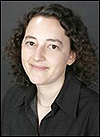 Sharon Weiss, assistant professor of electrical engineering, is one of 86 young American engineers selected to participate in the National Academy of Engineering’s (NAE) 16th annual U.S. Frontiers of Engineering symposium.
Sharon Weiss, assistant professor of electrical engineering, is one of 86 young American engineers selected to participate in the National Academy of Engineering’s (NAE) 16th annual U.S. Frontiers of Engineering symposium.
Engineers ages 30 to 45 who are performing exceptional engineering research and technical work in a variety of disciplines will come together Sept. 23-25 at the IBM Learning Center in
Armonk, N.Y. They will examine cloud computing, autonomous aerospace systems, engineering and music, and engineering inspired by biology.
“As we face the challenges the next century brings, we will rely more than ever on innovative engineers,” said NAE President Charles M. Vest. “The U.S. Frontiers of Engineering program is an opportunity for a diverse group of this country’s most promising young engineers to gather together and discuss multidisciplinary ways of leading us into the economy of tomorrow.”
The participants – from industry, academia, and government – were nominated by fellow engineers or organizations and chosen from approximately 265 applicants.
Weiss won a National Science Foundation CAREER award in 2008, a Young Investigator Program award from the Army Research Office and a Presidential Early Career Award for Scientists and Engineers in 2009. A PECASE is the highest honor bestowed by the United States government on young professionals in the early stages of their independent research careers.
Weiss’ research involves sensors made from porous silicon, a material with billions of tiny nanometer-sized holes (1,000 times smaller than the thickness of a human hair). The extraordinarily large internal surface area of porous silicon facilitates the capture of biomolecules. By evaluating how light interacts with the porous silicon, it is possible to detect the presence of trace amounts of biological material.
Sensors made in her photonic crystals laboratory have been used to identify specific DNA sequences and will be used to detect various toxins and viruses.
Sponsors for the 2010 U.S. Frontiers of Engineering are IBM, The GraingerFoundation, Air Force Office of Scientific Research, Defense Advanced Research Projects
Agency, Department of Defense (DDR&E), National Science Foundation, Microsoft Research, and Cummins Inc.